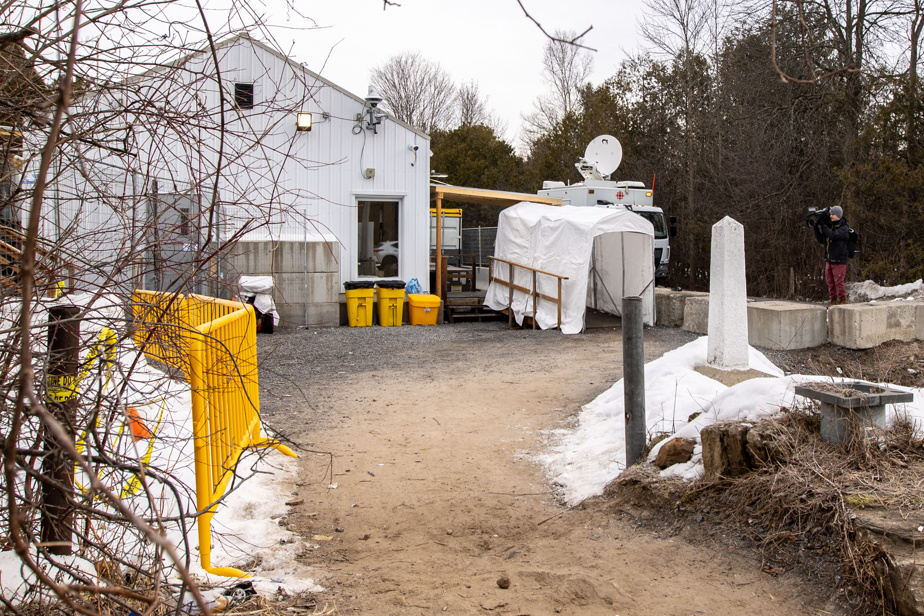The Royal Canadian Mounted Police (RCMP) has no immediate plans to dismantle the facilities that have been erected near Roxham Road to accommodate the thousands of asylum seekers crossing the Canada-US border from erratically each month, despite the recent closure of this crossing by Canadian and American authorities.
The Canada Border Services Agency (CBSA) and the Department of Immigration also intend to maintain a definite presence in the vicinity of Roxham Road, which has become the international symbol of an irregular migratory flow between Canada and the UNITED STATES.
Changes made to the Safe Third Country Agreement following President Joe Biden’s visit last month, which allow any asylum seeker to be turned away regardless of the route they take to reach Canada, therefore not a game-changer for the RCMP and CBSA at this time.
“All facilities near Roxham Road have been set up by RCMP Property Management. Over the years, some sites have undergone modifications in order to meet our various operational needs and to optimize our facilities. Therefore, we will observe the trends and the impact on our needs in order to adapt our facilities, “said in an email to La Presse Corporal Tasha Adams, of the RCMP communications office.
Public Services and Procurement Canada – which is responsible for negotiating and signing contracts on behalf of other federal government departments – offered a similar story.
Result: the contracts without tenders that were awarded to the companies of Pierre Guay, a businessman who owns many lands and premises located near the border crossing of Saint-Bernard-de-Lacolle, will remain in force until at further order.
“Public Services and Procurement Canada continues to support the Canada Border Services Agency (CBSA) and Immigration, Refugees and Citizenship Canada (IRCC) in their operations, meeting their facilities and service needs. For the moment, they have indicated that they are maintaining their need, and the leases with the companies owned by Mr. Guay are ongoing, ”confirmed Stéfanie Hamel, spokesperson for the ministry, in an email to La Presse.
In order to respond to a significant increase in the number of asylum seekers using Roxham Road, Canadian authorities found it necessary to modify the facilities used by the RCMP, CBSA and the Department of Immigration. Last fall, a new modular complex was erected at a cost of half a million dollars, according to Radio-Canada. The new facilities, which are located next to an already existing building, replaced a marquee and a trailer, which had become too cramped due to the increase in the number of applicants. The RCMP has leased these facilities until March 2024, with renewal options until 2026.
Last year, the RCMP intercepted a record 39,540 refugee claimants who crossed the Canada-US border irregularly using Roxham Road.
Last week, eight people – four from India and four from Romania – died trying to enter the United States illegally from Canada, via the Mohawk Territory of Akwesasne, which straddles Quebec, l Ontario and New York State.
This tragedy occurred days after amendments to the Safe Third Country Agreement came into force.
Of these, 125 asylum seekers were returned to the United States based on the Additional Protocol to the Safe Third Country Agreement and 42 were deemed eligible to continue their protection claim in Canada. One individual withdrew their application and voluntarily returned to the United States.
“When people crossing between ports of entry are intercepted by the RCMP or local police, they are brought to a designated port of entry. Once at the port of entry, the Canada Border Services Agency determines whether the application is eligible under the Additional Protocol to the Safe Third Country Agreement. If a person does not meet an exception to the Agreement, or if they are deemed inadmissible for another reason, they are sent back to the United States,” said Audrey Champoux, press secretary to the Minister of Public Safety, Marco Mendicino.
She clarified that if the application is admissible, the person’s file is forwarded to the Immigration and Refugee Board for review, and the person will be allowed to enter Canada to pursue an application for asylum.
She added that the CBSA is working with U.S. Customs and Border Protection to “ensure the safe return of returned individuals, including arranging transportation, if required.” “.

